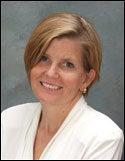LEGAL CENTS: Public speaking does not have to be terrifying
By: Jane Pribek//June 4, 2014//

Wausau attorney Brenda Sunby remembers being so terrified of being called on in one particular law school class that she used to dig her fingernails into her hands until they bled.
Gosh, wasn’t law school fun?
The justification for the Socratic Method has always been that it’s excellent practice for public speaking and learning to think on your feet. While that might be true for some, it wasn’t for Sunby, who said she didn’t really overcome her fear of public speaking until she started practicing, first with Habush, Habush & Rottier SC, Milwaukee, and now with Sunby Law Office.
Ultimately, Sunby said, she became extremely comfortable in the courtroom and logged enough trial time to become the fourth female lawyer in Wisconsin to earn certification as a civil trial specialist.
Clearly, public speaking is critical for litigators. But even transactional lawyers are tapped from time to time to speak to a board, groups of employees, etc.
And for some attorneys, such as John McCoy of McCoy Leavitt Laskey LLC, Waukesha, public speaking is a critical business development tool.
So, if you’re one of the many whose skin crawls at the thought of speaking in front of an audience, Sunby and McCoy have tips to ease your pain.
For starters, if you’re scared, start small and build up to larger audiences and longer presentations. For court, Sunby said, that meant initially second-chairing and examining the “small” witnesses first, and then building up to openings and closings and motion hearings, until she could do the trials solo.
For presentations, Sunby said, start with small, friendly audiences. She’s involved in the Wisconsin Association for Justice Women’s Caucus, where members gain public-speaking practice by addressing that group. But if WAJ doesn’t work for your practice, Sunby said, try a local bar meeting, your church or Toastmasters.
Initially, Sunby said, she wrote narratives of what she planned to say and committed them to memory. That technique has pitfalls however, as a prepared speech easily can be thwarted with a question or objection, and it can be too tempting to just read from the paper. So once Sunby built her confidence, she stopped writing every word and switched to an outline on note cards instead.
And it’s easy to remember what to say when you know your material, McCoy said.
“You need to have a good grasp of it,” he said. “And you also want it to be entertaining.”
For the most part, he said, lawyers are natural storytellers. McCoy said he likes to talk about cases, odd or funny things that happened at trial, or what not to do.
“If you can pull off humor, great,” he said. “Just make sure it’s actually funny.”
Props or visuals can be helpful to jog your memory and keep the audience engaged. With small groups, bring something to pass around, McCoy suggested.
And while you’re getting adjusted to the spotlight, be sure to avoid common missteps of nervous speakers. Don’t carry a pen, as Sunby noted it’s very distracting for the audience when a nervous speaker is tapping or clicking a pen and isn’t even aware.
Nervous speakers also tend to speak fast and softly, she said. Remember to project your voice and slow down to a cadence that’s easy for the audience to understand. Practice in front of a mirror.
To stay on track and keep the audience engaged, stick to a theme, McCoy said. And plan a conclusion that ends on a high note. Speaking of that ending, get to it. Be brief. No one’s going to complain if you’re done early.
Most presentations end with Q&A. Sunby said it’s OK not to have all the answers. If you’ve chosen your subject matter well, you’ll know the important answers. And for the questions that no one could’ve anticipated, it’s better to say you’ll find out the answer later.
Finally, know that everyone has their fallback phrases such as “well” “um” “like” and “OK.” Try to be aware of yours to avoid overuse.
And don’t forget to cut yourself some slack, Sunby said.
“Don’t expect to give a perfect, presidential speech,” she said. “Even the president is reading off a teleprompter.”
Legal News
- Wisconsin attorney loses law license, ordered to pay $16K fine
- Former Wisconsin police officer charged with 5 bestiality felony counts
- Judge reject’s Trump’s bid for a new trial in $83.3 million E. Jean Carroll defamation case
- Dozens of deaths reveal risks of injecting sedatives into people restrained by police
- The Latest: Supreme Court arguments conclude in Trump immunity case
- Net neutrality restored as FCC votes to regulate internet providers
- Wisconsin Attorney General asks Congress to expand reproductive health services
- Attorney General Kaul releases update at three-year anniversary of clergy and faith leader abuse initiative
- State Bar leaders remain deeply divided over special purpose trust
- Former Wisconsin college chancellor fired over porn career is fighting to keep his faculty post
- Pecker says he pledged to be Trump campaign’s ‘eyes and ears’ during 2016 race
- A conservative quest to limit diversity programs gains momentum in states
WLJ People
- Power 30 Personal Injury Attorneys – Russell Nicolet
- Power 30 Personal Injury Attorneys – Benjamin Nicolet
- Power 30 Personal Injury Attorneys – Dustin T. Woehl
- Power 30 Personal Injury Attorneys – Katherine Metzger
- Power 30 Personal Injury Attorneys – Joseph Ryan
- Power 30 Personal Injury Attorneys – James M. Ryan
- Power 30 Personal Injury Attorneys – Dana Wachs
- Power 30 Personal Injury Attorneys – Mark L. Thomsen
- Power 30 Personal Injury Attorneys – Matthew Lein
- Power 30 Personal Injury Attorneys – Jeffrey A. Pitman
- Power 30 Personal Injury Attorneys – William Pemberton
- Power 30 Personal Injury Attorneys – Howard S. Sicula








